Photographs: Gareth Cattermole/Getty Images Aseem Chhabra in New York
Some fairy tales are true.
Just look at Freida Pinto's life in the past four years.
She got a huge break in Danny Boyle's Slumdog Millionaire. She followed it up with film projects with Woody Allen (You Will Meet a Tall Dark Stranger), Julian Schnable, (Miral), Tarsem (Immortals) and Rupert Wyatt (Rise of the Planet of the Apes).
In four years, Pinto has become one of the most recognisable Indian faces in the world -- from a L'Oreal model to appearing on major talks shows to the covers of celebrity and fashion magazines.
Her latest film -- Trishna, directed by the prolific British filmmaker Michael Winterbottom, and based on the 19th century novel Tess of d'Urbervilles -- had its world premiere at the Toronto International Film Festival in 2011. Trishna opened in limited release in the US last week.
Pinto spoke to Aseem Chhabra about the challenges of playing a character first visualized by Thomas Hardy and how she got where she is today.
'It took a lot to just shut up at times'
Image: Freida PintoPhotographs: Gareth Cattermole/Getty Images
Your character is so quiet and passive in the film. What does it take to withhold and be so quiet internally?
It took everything to be quiet. People, who know me on a personal level, know I am very outspoken. I speak my mind and like to be heard. That is so different from Trishna. I'm sure she would like to be heard as well but she cannot be so outspoken. Tradition and the way she is brought up holds her back. So it took a lot to just shut up at times. It was anguish to be honest, because physically it started feeling like a burden.
I tell people it drained a lot out of me. But I don't mean that I don't want to do something like that again, but it is very painful to play someone who is suffering. Even though I am not Trishna and I have never been through her situation, getting a glimpse into her life was more than enough to convince me that I never want to experience it.
Is it the most challenging role you have done? It is certainly the meatiest role that you have done so far.
Yes, it is definitely the meatiest role. I don't look at the meat in a role as most amount of challenge, because sometimes two or three lines in a film can pose a bigger challenge than a hundred lines. But this was definitely a challenge, because I am Indian, and because I am portraying an Indian girl from another setting. The pressure portraying it as truthfully as possible was more challenging than anything else.
'I worked as a waitress before we started shooting'
Image: Freida Pinto with costar Riz Ahmed in TrishnaOne of the things that has struck me is how much you have evolved as an actress, specifically in this role.
Thank you. I think I learned working for the other directors, before Michael gave me this role. Because I never went to acting school and I never had a drama teacher. I had to learn on the job. So I am serious when I say that I give all the previous directors and the teams I have worked with so much credit. Even working with other actors and seeing how much importance they pay to body language or in just describing to themselves and the directors.
There is a lot of study of Trishna's body language.
Definitely. Oh my god, I felt my shoulders really suffered in the film. A couple of days before we started filming, I did become a waitress in one of the hotels. I wore their uniform, carried trays with wine glasses and serving the customers. The only mistake I made was that I wore my watch and Michael saw it and said, "Trishna would not wear that watch."
I had to really nail the body language of the male and the female staff and I found that everyone had their shoulders falling forward and their gaze was slightly lower than that of the customers. There was humility, and not the Bombay girl confidence I have. So I had to strip that off.
'The dialogues were all improvised'
Image: A scene from TrishnaAs a director, how does Michael work? You have said that there wasn't a full script as such.
We had the book, we knew we had to take Tess and put her in the Indian cultural setting. Michael had a very strong treatment and a concept that was given to us prior to filming.
For me, it was very important to have that, since I was speaking in Hindi and Marwari and improvising in both the languages. Hindi was okay, but I had never spoken Marwari.
Michael drove the scenes the way he wanted to. He gave us a lot of freedom to go as far as we wanted to and pull back as much as we wanted to and he would be the one who would orchestrate the scenes.
My question was how were you prepped for each scene without the script and dialogues?
The night before each shoot we would sit down and talk about this is where Trishna has arrived in her journey, and where Jay is in his journey.
And the dialogues?
They were completely whatever came naturally to us.
They were all improvised?
Yes (laughs).
I can imagine where one moment Anurag (Kashyap) says, "I ate your cherry" to Kalki (Koechlin). That was just him.
Yes, that was Anurag himself (laughs).
For me, I felt a bit frustrated because I was not allowed to speak so much. Every time I wanted to chime in, such as when I am talking to my roommates and I was going to say something about Trishna's dreams, Michael would stop me saying that "Trishna may have the dreams, but she wouldn't be able to voice them."
'Michael told me: 'Stop all of this Bollywood rubbish of yours''
Image: Freida PintoPhotographs: Alberto E. Rodriguez/Getty Images
I found the arc of your relationship with Jay fascinating. It starts with disbelief that a wealthy young man is paying attention to your character, there is love in Mumbai and finally it is such an uneven, devastating relationship.
People ask me why Trishna goes back with Jay, and I say think of it culturally. She comes from rural Rajasthan. She is pregnant before her marriage and gets an abortion. She has already brought shame on her family, where would she go? Her family knows that she has been living with a man in Mumbai. I think the burden of knowing her background was already disturbing enough and then we just took it to the next level.
It was very disturbing. There is the rape scene, but more than that it was hard for me to dance for Jay towards the end. She is forced to do something she doesn't want to do, although she used to love to dance. And there were some things that are not in the final cut.
At one point he said to me, "Stop all of this Bollywood rubbish of yours." I wasn't expecting it and almost took offence. I almost wanted to say to him, "Don't talk about my culture like that." It was a mixture of all that what made it real, as opposed to having written dialogues.
'To some people it appears as if it (the post-Slumdog fame) happened quickly'
Image: Freida PintoPhotographs: Jason Merritt/Getty Images
Look at where you have reached. And how did it happen so quickly?
To some people it appears as if it happened quickly. But I feel that for someone who has been waiting for this to happen, it doesn't seem that quick. It feels like whatever is coming now, is meant to be and I am going to take it and grab every opportunity. I feel that it has been a great journey and it is all about learning, making mistakes more importantly and being able to take things in a stride.
Can you tell me what mistakes you have made?
Not mistakes that I regret. But when I look at performances I say I could have done it bit differently. I am sure a year from now I will also say that about Trishna. They are good mistakes that one learns from. And if it wasn't for Slumdog where would I be making these mistakes.
'I always get the double look in Mumbai where I walk by and people look, but aren't sure'
Image: Movie poster of TrishnaWoody Allen, Julian Schnabel -- these are very big names. Obviously you worked hard to get here.
I auditioned for all of the roles. Trishna came to me from Michael Winterbottom directly.
At the Indo American Arts Council screening, a Daily News critic asked you about your fans in India. Are you able to walk on the streets of India? Are you recognized in India?
I am able to walk on the streets in Mumbai. I can walk on the streets of any country in any part of the world and I think it is so, because I want to keep it that way. I don't want it to happen that I feel stifled or that I have to wear a disguise.
In India, Bollywood stars have a tough time walking around freely.
I know that's different, but I have not done a Bollywood film. I get a different kind of treatment, which I call the curiosity treatment. I always get the double look in Mumbai where I walk by and people look, but aren't sure. So I can continue with my shopping. It is really sweet that one doesn't have to feel the pressure.
'Only I know how much I have learned from the filmmakers I've worked with'
Image: Freida Pinto in TrishnaThere is a sense in India, some people don't understand how you made it so big. There is the envy factor among some, I can say that. There are some people who don't take you seriously, although you have done so many big films. Do you agree with me?
To some extent, I do agree with you. It has taken me a while to make my peace with that and also to understand where they are coming from. Some of my films have not been released in India so for them to make comments about Miral or about the Woody Allen film "Such a small role, why did she do it?"
Because it was Woody Allen...
Yes. Or to work with a visual filmmaker like Tarsem. Only I know how much I have learned from them. So I guess what people don't know, they always talk about, but what I know is always going to be precious to me. Now I am not affected by it. I think I have grown up.
Were you affected by it at all?
Yeah of course, I am human. I was definitely affected by it. I remember my dad saying "Maybe they should screen all of your films," because he has seen them all, except Trishna. I said "No dad, I will just go as far as I need to and the rest of it will speak through my work." Whatever is due will be given to me.

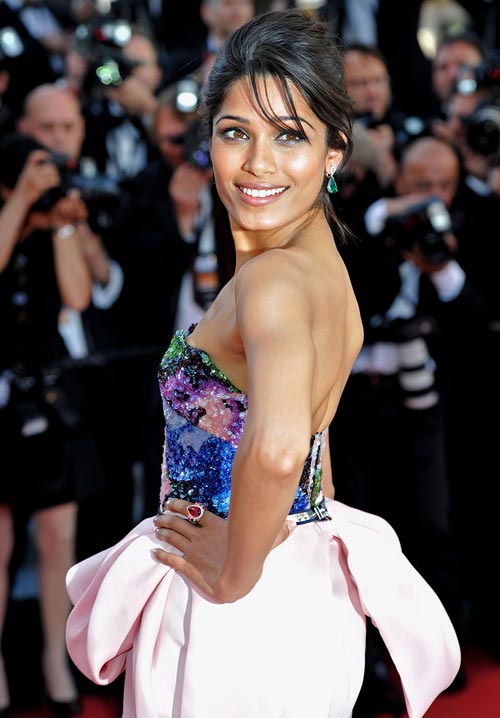


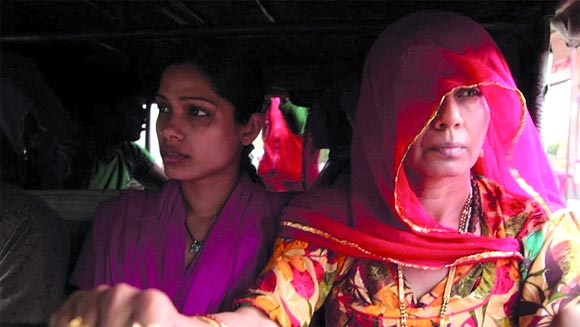
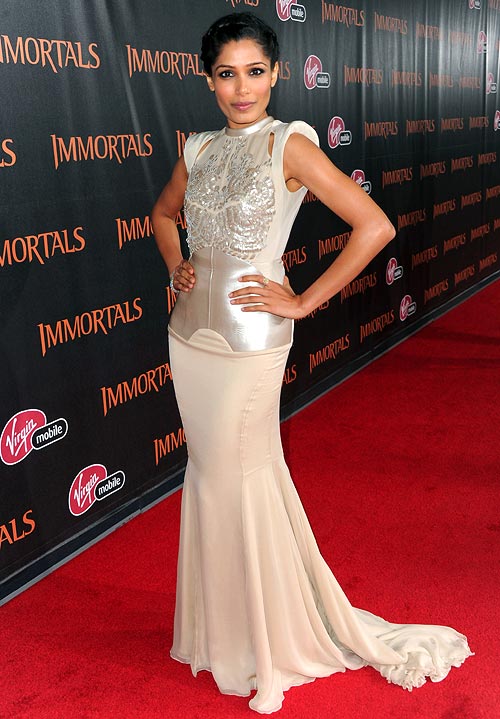

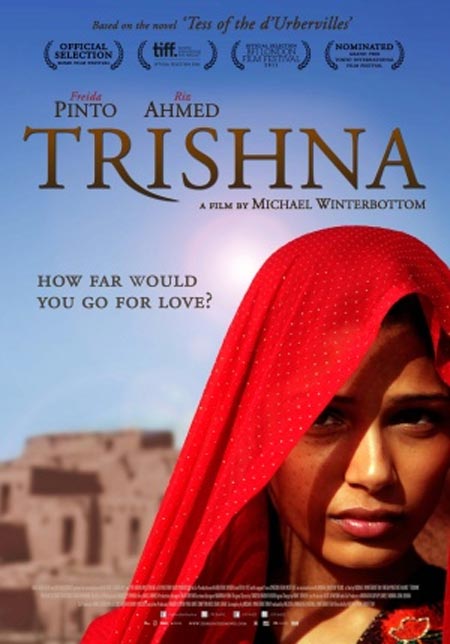
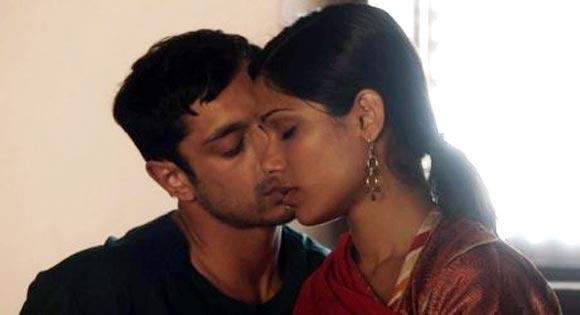
Comment
article